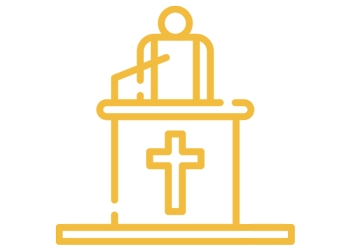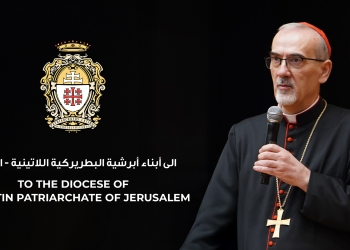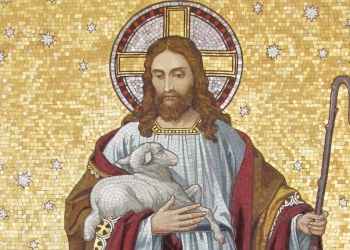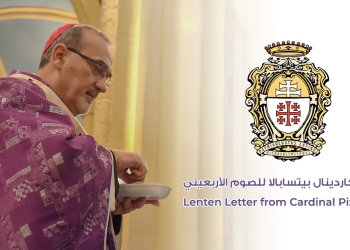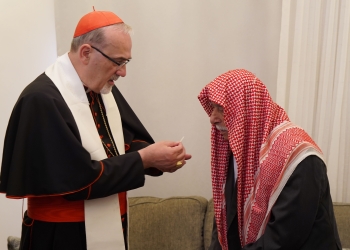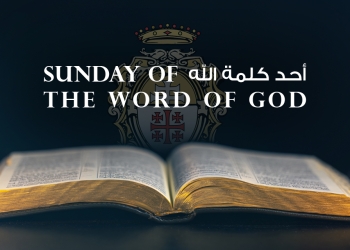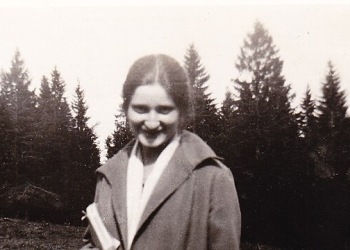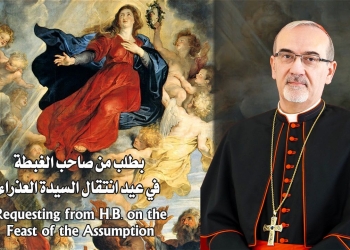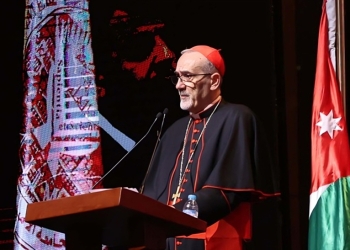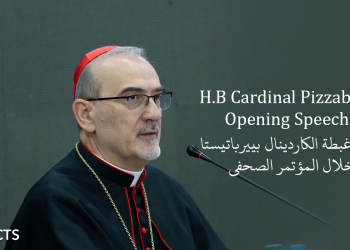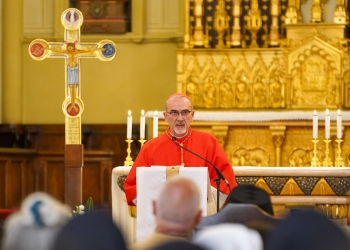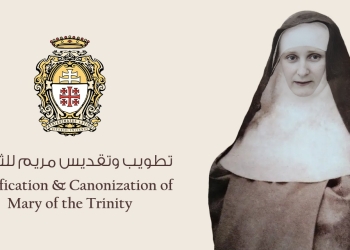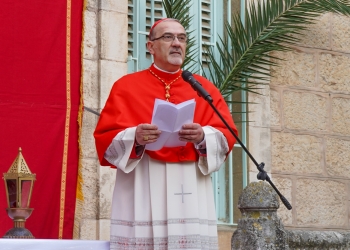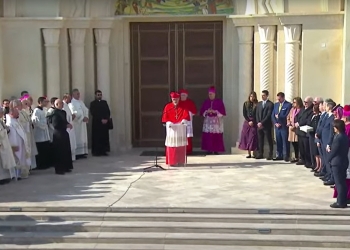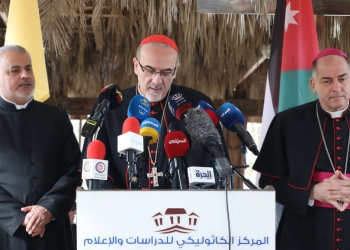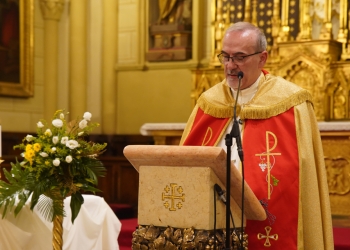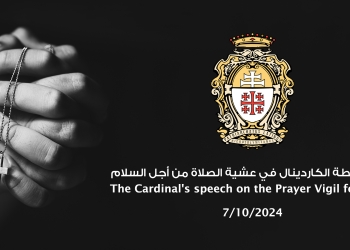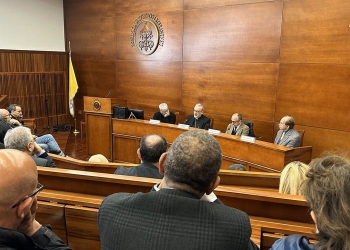Introduction
Thank you for your invitation, which I have been honored by. I am grateful to your venerable institution, with which we have been in collaboration for many years now. Thanks to the fact that the Latin Patriarchate Theological Studies has been granted affiliation with the Faculty of Theology. I consider this link between Rome and Jerusalem of fundamental importance for the Church today. I also take this opportunity to extend my best wishes to the new Magnificent Rector, Msgr. Amarante, the new Pro-Rector, Msgr. Ferri, and the new Dean of Theology, Msgr. Lameri.
What is happening in the Holy Land is an unprecedented tragedy. In addition to the seriousness of the increasingly deteriorating military and political context, the religious and social context is also deteriorating. The dividing lines between communities, and the few but important contexts of interreligious and civil coexistence are gradually disintegrating. Instead, an attitude of distrust is growing progressively by the day. A bleak landscape. There is certainly no lack of hope among the many people who still, despite everything, want to work for reconciliation and peace. But we must realistically recognize that these are niche realities and that the overall picture remains very worrying.
In addition to binding me even more to the flock I shepherd, this tragedy provoked countless reflections on peace. Today, can one still “think of peace” in the Holy Land? “Peace” seems to be a distant, utopian word empty of content, if not the object of endless manipulation. Not infrequently, the same people who are in favor of peace end their speeches by saying that to reach it, war is inevitable.
Our land is still bleeding, and our people are in the grip of fear and uncertainty of the future. Many, too many, have only rubble in front of them.
The theme you have proposed to me for this lecture - Characteristics and Criteria for a Pastoral Care of Peace - can only be briefly presented here, without exhaustive intentions. My task here - as I understand it - is not to make a discourse and propose general criteria for building contexts of peace, or concrete paths of possible peace. The paths and criteria, as we know, are many: besides religious ones, there are economic, political, social, media, and educational ones. They are closely related to the concepts of memory, identity, and much more. That is to say, it is a very broad topic. This will not be the scope of my presentation, but rather an introduction based on my experience as a pastor in the Holy Land. Starting from my own experience, I will try to indicate some criteria on which the Church of the Holy Land should base its action for peace, in that specific context, which today has become the focus of attention throughout the world, as well as a source of division in many other parts of the world.
- Looking at the face of God
First, I think it is important to clarify why peace is a central theme for the life of the Church and its actions in the world.
The first peculiarity of peace is that it, before being a human project conforming to the divine will, is a gift from God; indeed, it says something about God himself: Adonài shalòm, “The Lord is peace” (Jdg. 6:24; cf. Compendium of the Social Doctrine of the Church, no. 488). As is well known, the Hebrew - shalòm- as indeed its Arabic counterpart - salàam- indicates much more than a warless sociopolitical situation: it expresses the “fullness of life”, which acts as an integral approach. It is thus not just a human construction or an achievement of human coexistence, but rather a reality that comes from God and a relationship with him: it is the fulfillment of the Messianic promises (cf. Is 2:2-5; 11:6-9). Jesus Christ, the Messiah is Sar shalòm, “Prince of Peace” (Is 9:5), he is “our peace” (Eph 2:14), the one who has broken down the barrier between men, the wall of enmity that was between them (cf. Eph 2:14-16).
From Jerusalem resounded the cry of the Risen One that reached to the ends of the earth: “Peace be with you!” (Jn 20:19). Not for nothing, this is the first word of the Risen One to the Apostles and women gathered in the Upper Room, and as new and risen men, it must also be our first and last word. It is not a “worldly peace” - Christ says - but “my peace” (Jn 14:27). Therefore, “our peace” comes from “His peace,” for he gives us himself, who died and rose again for us. The heart of peace is the paschal mystery of Christ. It is precisely by this mystery that peace, which is Christ, becomes at the same time reconciliation with God, and between people. For this reason, it must be forcefully reiterated today, that all pastoral action of the Church, as indeed all her social work, can never in any way be separated from evangelization (cf. Compendium of the Social Doctrine of the Church, no. 493): the proclamation of the Gospel is the proclamation of the “gospel of peace” (Eph. 6:15), and he who evangelizes proclaims peace even to his enemies, just as Peter did to Cornelius, who was - and we should never forget this in these times! - centurion of the military forces occupying his land (cf. Acts 10:36).
This first and exquisitely theological peculiarity of peace provides us with the first and basic criterion for peace: to look upon the face of God. This criterion was pointed out by St Paul VI when, while he was busy concluding the Council, he wanted to call the people back to peace, not by chance, on the feast of St Francis of Assisi, on 4 October 1965, before the representatives of 116 nations, in the United Nations glass building in New York. The importance of this speech comes from the fact that no Pope in history had ever delivered a peace speech in person before the diplomatic representatives of the world's highest assembly. At the end of his speech, the Pope, with great parochial and prophetic spirit, called the nations to base peace on faith and conversion to God: “The edifice you are building does not rest on purely material and terrestrial foundations, for in that case it would be a house built on sand. It rests most of all upon consciences. Yes, the time has come for "conversion," for personal transformation, for interior renewal… The real danger comes from man, who has at his disposal ever more powerful instruments that are as well-fitted to bring about ruin as they are to achieve lofty conquests. To put it in a word, the edifice of modern civilization has to be built on spiritual principles, for they are the only ones capable not only of supporting it, but of shedding light on it and inspiring it. And we are convinced, as you know, that these indispensable principles of higher wisdom cannot rest on anything but faith in God”.
This implies two things, which always go hand in hand: being aware of one's weakness and seeing God's face. There is a passage in the book of Genesis, which I always like to recall, indicating how one recognizes God's face. I refer to the well-known episode of Jacob in his struggle with a mysterious personage on the banks of the Jabbok, on his journey to meet his brother Esau, with whom a reckoning is coming. In that singular struggle, Jacob recognizes the face of God, so much so that he calls the place of struggle “Peniel,” the “face of God.” From that troubled night he emerges limping, but confessing, “I have seen God face to face!” (Gen 32:31). He emerges defeated but victorious, limping but leaning on God. Only by limping can Jacob go to meet his brother-enemy: Esau embraces him and the two weep. At this point, Jacob addresses Esau with one of the most beautiful phrases in the Bible, sometimes inadequately translated and which I, therefore, render literally: “To see your face is for me like seeing the face of God” (Gen. 33:10). Only when we have experienced our weakness and, in this, have encountered the face of God, are we ready to go out to meet the brother-enemy. If we do not go to meet the other with a limp, we constantly risk opening scenarios of war, because the other is no longer a fellow man, but an enemy, to be feared or eliminated.
In the Bible, however, there is also the opposite, confrontational perspective. Indeed, the book of the prophet Obadiah describes the dark side of that relationship, declaring to Edom, the descendants of Esau: “Because of violence to your brother Jacob, disgrace will cover you, you will be done away with forever!” (Obad 10). Hence, the same prophet's exhortation, as relevant today as ever: “Do not gloat over the day of your brother, the day of his disaster” (Obad 12).
- Looking at the face of the other person
What we have just affirmed leads us to the second characteristic of peace: in addition to being a divine reality, it is a human and social reality, a universal value, and an inescapable duty that calls all to act, on the pain of man's self-destruction. However, peace on an anthropological level, is not just a social convention, armistice, mere truce, or absence of war, the result of diplomatic efforts and global or local geopolitical balances, which in the Holy Land are unfortunately collapsing! Of course, under the current conditions, that would be eminent! Yet, peace is much more: it is based on the truth of the human, which alone can lead to an authentic omnium rerum tranquillitas ordini ‘the tranquility of order’ (cf. St. Augustine, De Civitate Dei XIX,13,1), because it is established according to justice and charity.
And here, then, is the second criterion: put man back at the center, return to the face of the other, to the centrality of the human person and his unparalleled dignity. When the face of the other fades away, so does the face of God and thus true peace. Only in the context of integral human development, with respect for human rights, can a true culture of peace be born and the rise of “unarmed prophets, who are often the objects of ridicule” (Compendium of the Social Doctrine of the Church, no. 496), of witnesses and pillars of peace. The world needs them more than ever, even at the cost of being persecuted and branded as utopians and visionaries. For peace, one must always take risks. One must be willing to lose honor, to die like Jesus.
Jewish philosopher Emmanuel Lévinas stated, “In the simple encounter of a man with the Other, the essential, the absolute is at stake. In the manifestation, in the 'epiphany' of the face of the Other I discover that the world is mine insofar as I can share it with the Other. And the absolute is played out in proximity, within reach of my gaze, within reach of a gesture of complicity or aggression, of welcome or rejection” (The Epiphany of the Face, cited in C. Pintus, “Including to communicate,” in E. Cauda - L. Scursatone [ed.], Education, communication, and Italian sign language, Varazze 2017, 14). No one is an island: when we destroy the face of the other, we also dissolve our own, especially in the era of global interconnectedness in which we live. If we sink, we will sink together, in the same boat, because we are more than ever in a global village.
- The Church’s mission.
After this brief look at the theological and human aspects of peace, we must now come more directly to the topic you have proposed and ask how this dimension is expressed in the life of the Church. How the Church is called to give such proclamation and witness. As I said at the beginning, I will limit myself here only to sketching a thought about the Church of Jerusalem, based on my personal experience, with no presumption.
For a long time now, our Church has been reflecting on this war-torn context of ours; a reflection that is constructive and at the same time true, real, and does not fall into discounted slogans or obvious platitudes. The conflict with its consequences involves the lives of everyone in our diocese and is therefore an integral part of the life of the church, of its pastoral care. Everything we are and do has to do directly and indirectly with the conflict and its consequences, from the more practical aspects to the increasingly heated reflection on more complex issues: from closed borders and crossing, permits given and not given, to reflection on occupation and the possible Christian response to it. What I mean to say is that conflict is not a temporary and secondary issue in the life of our church, but is now an integral and constitutive part of our identity as a church: conflict and division, with the consequences of hatred and resentment, are an ordinary reality with which we have to reckon, and which requires on the part of the Christian community a continuous journey of reflection and spiritual, pastoral and social elaboration. To speak of peace, therefore, for us is not to speak of an abstract theme, but of a deep wound in the life of the Christian community, which causes suffering and weariness, and touches the human and spiritual life of all of us deeply.
I don't know if we have been able to arrive at a synthesis in the interpretation of this theme, probably not yet. I think that for us the reflection regarding the witness on peace will always be a work in progress, we will never have a complete and conclusive discourse, but we will have to reckon with the continuous developments of the various political frameworks that gradually form and unravel, and their consequences on the lives of the peoples of the Holy Land. Situations that question our faith time and time again. And perhaps this is not even the time for synthesis, but for listening. Listening to the different voices, feelings, visions, labors, and hopes, and trying to read them in the light of the Gospel. However, striving to identify some common features, characteristics, and criteria that will still have to accompany our reflection permanently.
In fact, we cannot fail to ask ourselves how to live out peace in Jerusalem, a city called to be the custodian of peace, but continually torn and contended.
For us, the Church of the Holy Land, set in the context of a multi-religious and multi-cultural society, rich in diversity but also divisions, the ‘peace of Jerusalem’ of which Psalm 121 speaks, is not the suppression of differences, the annulment of distances, but neither is it a truce or a pact of non-belligerence guaranteed by pacts and walls. We are convinced that it is based on a cordial and sincere acceptance of the other, on a tenacious willingness to listen and dialogue, that our community is called to be an open road on which fear and suspicion give way to knowledge, encounter, and trust, where differences are opportunities for companionship and collaboration and not a pretext for war.
We will increasingly have to move away from the preoccupation with occupying physical and institutional structures and focus more on beautiful and good dynamics of life that, as believers, we can initiate. Of course: sometimes even for us the temptations of flight and resignation, easy compromise with power, or violent response may appear as the only possible reaction to the difficult time we are given to live in.
However, as believers and religious, we will be an “interesting” presence to the extent that our prophecy will be our daily witness, because in a social and political context where overwhelm, closure, and violence seem to be the only possible word, we will continue to affirm the way of encounter and mutual respect as the only way out capable of leading to peace.
Peace needs the witness of clear and strong gestures by all believers, but it also needs to be proclaimed and defended by spoken words.
For this reason, we often find ourselves at a crossroads, almost called upon to choose between the necessary denunciation of violence and abuse, always perpetrated to the detriment of the weakest, and the risk of reducing religion to a ‘political agent’ or even to a party or faction, forgetting its true nature and exposing it to easy and superficial exploitation. Our being in the Holy Land as believers cannot be enclosed in devotional intimism, nor can it limit itself only to the service of charity for the poorest, but it is also parochial, that is, it cannot refrain from expressing, in the ways proper to each religious experience, a judgment on the world and its dynamics (cf. Jn 16:8.11). We know well how politics envelops ordinary life in all its aspects in the Middle East. Everything becomes politics and this seriously questions all our religious institutions and our faithful, who await from us a word of hope, of consolation, but also of truth. What is required here is a truly difficult discernment that has never been achieved once and for all, requiring the ability to listen to all voices, but also to interpret critically, and therefore also prophetically, the present.
We cannot remain silent in the face of injustice or invite quiet living and disengagement. However, the preferential option for the poor and weak does not make us a political party. Taking a stand, as we are often asked to do, cannot mean becoming part of a confrontation, but must always translate into words and actions on behalf of those who suffer and groan and not into slogans and condemnation against anyone. It may be easy and convenient at times to join the chorus of criticism and recrimination and we may even gain applause and approval, but this may be a worldly temptation. In short, as believers we are called to love and serve the polis and to share with all concern and action for the common good, in the general interest of all and especially the poor, always raising our voices to defend the rights of God and man, but without entering the logic of competition and division.
Having made these premises, the question to be asked now: how do we live like this, what are the needed characteristics and criteria, the elements on which to base this style of ours, this way of being in the Holy Land, as Christians and as a church? What are the elements that must stably accompany our Christian reflection on peace, the criteria that must support our interpretation of the present situation? What are the areas of action on which to base a solid and credible ecclesial pastoral for peace? Of course, there are many, and always evolving, as I mentioned earlier. What we call a pastoral ministry of peace is no different from any other pastoral activity: it needs people, it needs a specific methodology, and clear spiritual foundations on which to base its action, on what, about what, and for what to work.
3.1 Leadership
In the context we have sketched above, the responsibility of religious leadership, especially in the Middle East, is essential. First, it is necessary to have guides, pastors, and leaders capable of listening and being the voice of their community and directing and guiding.
Instead of being the religious support of political regimes with little credibility, religious leadership should, first of all, cooperate with the best part of society in creating a new culture of legality, and become a free and prophetic voice of justice, human rights, and peace. As we stated at the beginning, these values are not only human values, but first and foremost an expression of God's desire for man. Our contribution as religious leadership to resilience and innovation amid today's enormous local challenges is not to reinvent the wheel: that is, to find new and modern operational strategies, but to be credible, sincere, and passionate witnesses of God ourselves.
I wonder if in the actions and words I use, I fear God more or the reaction of people, politicians, the media... In addressing my community, do I have the "courage" of "parrhesia", of guidance? Do I open new horizons? Or do I simply weigh my words so as not to be disruptive to anyone?
This is not a trivial issue. I would say it is central. Especially in these contexts of pain and disorientation, in a context where religion plays such a prominent public role, one must never stop asking oneself whether and how faith can orient one's community, to invite it to question itself, without settling down. Faith must be a comfort, a support, but also in a sense a disturbing element. If faith is based on an experience of transcendence, it must also lead thinking to transcend the present moment, open the boundaries of mind and heart, and go beyond.
In Deut. 30:15, God says, “See, I have today set before you life and good, death and evil”. We must take note that one can therefore not choose life and good, and we see this every day. However, we must also ask ourselves how to stand before those who make those choices of evil and death, and what is the right attitude of a believer toward those responsibilities. How should religious leaders act and behave in those specific situations, what kind of guidance should they give to their communities regarding not a generic evil, but about who perpetrates this evil, how to read those situations, objectively, in the light of God's Word?
Whether we like it or not, Faith and politics have always had a close relation to each other on the social relations level. In the Middle East, faith and religion have a function for the life of national communities, and politics has always consequently had to deal with religion and its public function.
Moreover, each generation has always had to identify the criteria and forms for regulating the relationship between these two spheres of each country's social life. Our generation, and those to come, are faced with challenges that we can describe as unique since in these times it is not only a matter of defining the relationship between the two spheres mentioned above, but also of rethinking the role of politics and religion, within themselves and not only in relation to each other. Not infrequently, national politics and religion find themselves in the same boat, accused of today's evil, incapacity, backwardness, and so on.
Moreover, Religious faith plays a key role in the rethinking of the categories of history, memory, guilt, justice, and forgiveness, which directly bring the religious sphere into contact with the moral, social, and political spheres. Cross-cultural conflicts will not be overcome unless different and antithetical readings of one's religious, cultural, and histories are reread and redeemed. The wounds caused in the remote and recent past, as they can be assumed, processed, and shared, will continue to produce pain even after years or even centuries. In this regard so stated by Pope Francis:
In many parts of the world, there is a need for paths of peace to heal open wounds. There is also a need for peacemakers, men and women prepared to work boldly and creatively to initiate processes of healing and renewed encounter. Renewed encounter does not mean returning to a time prior to conflicts. All of us change over time. Pain and conflict transform us. We no longer have use for empty diplomacy, dissimulation, double-speak, hidden agendas and good manners that mask reality. Those who were fierce enemies have to speak from the stark and clear truth. They have to learn how to cultivate a penitential memory, one that can accept the past in order not to cloud the future with their own regrets, problems and plans. Only by basing themselves on the historical truth of events will they be able to make a broad and persevering effort to understand one another and to strive for a new synthesis for the good of all. Every “peace process requires enduring commitment. It is a patient effort to seek truth and justice, to honour the memory of victims and to open the way, step by step, to a shared hope stronger than the desire for vengeance.
These paths cannot be taken. National communities, whether political or religious, need people who know how to promote, orient, guide toward that understanding of self and other, sometimes even at the cost of paying a high price in terms of loneliness, misunderstanding and rejection.
Of course, peace is not the sole responsibility of the pastor and/or religious leader. I would not like to give the impression that peace is only made by leaders. However, they are called to guide, accompany, as well as listen to, their respective communities, to create contexts in which communities can express themselves. The pastor alone does not make the community, but the community cannot exist without a pastor. In continuous dialogue, in listening to each other, and in sharing, a serious pastoral ministry of peace is born. The role of a leader, prophet, and voice of the pastor therefore remains inescapable.
- Interfaith Dialogue
As Rabbi J.A. Heschel wisely said, no religion is an island. Therefore, the Church cannot presume to operate a peace ministry alone, as if it were the only reality in the land. There would be much presumption in that. As if the whole world is waiting for our word and witness. It is not. At least it is not so in the Holy Land. Like the whole world now, we live in a multi-cultural and multi-religious context. Without the collaboration of other Churches and other religious communities, no ecclesial peace ministry can have substance. Collaborating with others on peace will also help heal the internal problems within our communities, for it is only in a sincere relationship with the other that we can best define ourselves in truth.
Different faiths, if understood in their genuineness and deep vocation, are bearers of reconciliation and peacemaking resources and are rarely the sole or main trigger for misunderstandings and conflicts, nor are they in themselves a risk factor in this regard. But if they become functional to political struggle, as is often the case in the Holy Land, religions become like gasoline thrown on the fire.
Interreligious dialogue has produced very beautiful documents on human fraternity, on being all children of God, on the need to work together for the preservation of an individual’s rights... These are all fruits of an activity that I consider spiritual.
Yet, in our current context of war, all this in the Holy Land today seems to be a dead letter.
There is a great absentee in this war: the word of religious leaders. With few exceptions, no speeches, reflections, or prayers have been heard in recent months from the religious leadership other than from any political or social leader. I hope to be proven wrong, but one gets the impression that everyone is speaking exclusively within the perspective of their community.
Interreligious relations that seemed to be established now seem to be swept away by a dangerous feeling of mistrust. Each feels betrayed by the other, not understood, not defended, not supported.
I have asked myself several times in recent months whether faith in God is really at the root and the formation of personal conscience, thus creating among believers a common understanding at least on certain central issues of social life, or whether our thought is formed and based on something else.
The Jewish world did not feel supported by Christians and expressed this clearly. The Christians in turn, divided as always on everything, incapable of a common word, were either divided in support of one side or the other, or uncertain and disoriented. Muslims feel attacked and considered conniving with the massacres committed on 7 October... in short, after years of inter-religious dialogue, we have found ourselves not understanding each other. It has caused me great sorrow, but also a great lesson.
From this experience, we will have to start again, aware that religions also play a central role in orientation, and that the dialogue between us will perhaps have to take an important step, and start from our current misunderstandings, our differences, and our wounds. It can no longer be a dialogue only between those belonging to Western culture, as it has been until now, but it will have to consider the various sensitivities, of the various cultural approaches, not only European, but first and foremost local. It is much more difficult, but we will have to start from there.
This war is a watershed in interreligious dialogue, which will never be the same again, at least between Christians, Muslims, and Jews.
And it must be done, not out of need or necessity, but out of love. Because, despite our differences, we love each other, and we want this good to find concrete expression in the lives not only of ourselves but also of our respective communities. Loving one another does not necessarily mean having the same opinions, but knowing how to express and appreciate them, and respecting and welcoming one another.
When it is sincere and addresses issues related to one's territory and respective communities, interreligious dialogue creates a mentality of encounter and mutual respect, it creates the necessary background on which subsequent political perspectives can then also be based.
Having identified the indispensable responsibilities of religious leadership concerning serious pastoral care for peace, and the ‘open’ way in which to operate. One must now ask what religious leaders must work on, both within their respective communities and in dialogue with each other. What should one work for, how, and with what style should one's communities live this central dimension of their faith?
I would say that the central theme is forgiveness. One cannot abstractly speak of peace, as if it were an idea. Peace is not something one has to do but is a way of being in life, an integral attitude of the person and the community, which in every context - personal and collective - must come to terms with the wounds caused by divisions, by attitudes of possession and exclusion, and hatred. In sum, it must come to terms with sin. And in this context, peace is closely linked to forgiveness. I would say that they can be considered, if not synonymous, then closely necessary to each other.
Biblical revelation tells us that like peace, so too forgiveness has its root in God's love, and requires first a personal journey, a path of understanding, of ‘taking on’ the evil received or committed. It can never come about through inertia. The evil committed cannot be forgotten but requires a precise will to overcome, which is the fruit of a clear and definite desire. It does not erase the wrong done but wants to overcome it for the greater good. Trying to forget, waiting for time alone to heal the wounds, not taking on the evil committed, identifying it, looking it in the face, calling it by its name, means making forgiveness a banal gesture, which does not heal any wound, does not change people's hearts, and does not produce peace.
At the social and political level, reflection on forgiveness takes a long time. The paths to be taken are often enormously complex because they must take into consideration not a personal or context-specific relationship, but a social one. That is, one must consider the collective wounds, the pain of all, the necessarily different understandings of the events at the origin of common pain, and the different kinds of interpretations.
To look to the future with hope and at rest, is necessary to go through a process of memory purification. Wounds, if not healed, create an attitude of victimhood and anger, which make reconciliation difficult, if not impossible. The wounds of the past will continue to be baggage to be carried on one's shoulders and a criterion for reading mutual relations. Until there is a purification of the common memory on everyone's part, until there is a mutual acknowledgment of the evil mutually committed and suffered, in short, until there is a reinterpretation of one's historical ties.
Faith naturally can open the believer to a relationship, because it opens him or her up to an encounter with God, which then naturally also becomes a glimpse of the other from oneself.
But what is also needed is a human education in forgiveness, a cultural formation that enables man to look at events not exclusively from the perspective of one’s wounds, which always has a limited and closed horizon. This will help interpret events on a both personal and collective level, with the future in perspective, which also considers the good of others, the social reality, and the need to reactivate life dynamics. Therefore, in this context, reflection on forgiveness can also be open to non-believers.
The first fruit of forgiveness is freedom from the emotional ties produced by resentment and revenge, which imprison any prospect of fostering a relationship within a circle of pain and violence. Forgiveness allows the healing of the human soul, reactivates the dynamics of life, and builds the future.
The necessary action must be taken in all spheres: political, religious, and civil, at the same time, including the various groups of aggregation and formation of thought such as schools, universities, and the mass media. Because people interact at all these levels. And forgiveness, in its function of healing the subject, can only act if it involves all the fibers of his being.
The Church, together with other faith communities, has a fundamental role in education for reconciliation, and in creating the context for an approach to forgiveness, but it cannot impose it. It is necessary to give time and respect to the pain of those who suffer, while also helping them to re-read their history, allowing wounds to heal. Often in the Holy Land, it is a matter of knowing how to wait. The hearts of people and communities are not always ready and free to speak of forgiveness. The pain is still too strong. It is often easier to deal with anger than with a desire for forgiveness. It is therefore necessary to know how to wait, but at the same time to propose the Christian way of peace without tiring.
So far, all the peace agreements in the Holy Land have failed, because they were often theoretical agreements, which presumed to resolve years of tragedy without taking into account the enormous load of wounds, pain, resentment, and anger that still smoldered and exploded in an extremely violent manner in recent months. Furthermore, no account was taken of the cultural and especially religious context, which instead spoke a language exactly opposite (starting with the local religious leaders) to that of those who spoke of peace.
Therefore, in this context, the pastoral care of the church cannot fail to have in its horizon of action the proposal of forgiveness and reconciliation, which takes into account wounds and pain but does not stop there. Pain can close in on oneself, but it can also open up new dimensions, it can turn into resurrection. Without this perspective, no political project can succeed in the Holy Land, and peace would remain just a slogan with little credibility. Hence, the task of the Church's pastoral work is to untiringly propose paths of reconciliation, to accompany efforts at healing, to propose languages that exclude no one, to patiently weave webs of relationships, to build trust within one's ecclesial community, and then with other religious communities with concrete gestures.
- Truth and Justice
Forgiveness, as I previously mentioned, is a central theme of the peace ministry. But in our context, forgiveness cannot be separated from two other words: truth and justice.
The suffering, the pain, the wounds that this conflict has caused are well known. I am not here to list the evils that are being done. That is not the theme of this meeting, and I think it is a theme known to all. And I do not intend here to enter the question of this phase of the conflict that is going on now, which began on 7 October.
For decades in the Holy Land, there has been the Israeli occupation of the West Bank territories, with all its dramatic consequences on the lives of Palestinians and also Israelis. The first and most visible consequence of this political situation is the condition of injustice, of non-recognition of basic rights, of suffering in which the Palestinian population in the West Bank lives. It is an objective situation of injustice.
As I said earlier, for our Church the conflict with its consequences, is an integral part of ordinary life, and is inevitably part of the thinking and reflection of the whole community. Not infrequently, as in this period, it is a matter of harsh and painful reflection and discussion. Maintaining communion between Palestinian and Israeli Catholics, in this torn and polarized context, is more difficult than ever.
Therefore, one cannot speak of forgiveness without speaking of truth and justice. Not to speak a word of truth about the life of a Palestinian, whose life has been a sum of decades of waiting for justice and dignity to be granted, would be to justify an objective situation of injustice.
In the Latin Patriarch of Jerusalem, I have found myself, since the beginning of this conflict, in a situation that requires a choice, and a clear and precise stance. How do I reconcile this call to take sides with what I am and what I have just said about forgiveness? How to defend the rights of God and man in this context, how to speak of forgiveness, to be faithful to Christ who on the cross freely forgave, without giving the impression of not defending the flock entrusted to me, its rights, its expectations? How to preach love to enemies without giving the impression of unwittingly confirming one narrative against the other, Israeli against Palestinian, or vice versa? How to heal divisions with firm and just choices, but without creating more divisions, and always with mercy?
More concretely, I am often asked: ‘How can I think of forgiving the Israeli who oppresses me, as long as I am under oppression? Wouldn't that mean giving him the upper hand, giving him free rein without defending my rights? Before talking about forgiveness, is it not necessary that justice be done?’ In turn, the Israeli, may add: “How can I forgive those who kill my people?” These are questions behind which there is real, sincere pain to be respected.
I do not know if it is possible to answer these questions, but one cannot avoid asking them. A peace ministry cannot ignore the wounds of its community, nor can it delude it with easy answers that do not touch real life. Some situations have no immediate solutions and perhaps no solutions at all. But there is nevertheless a Christian way of being within a conflict. Peace can be experienced even in these circumstances. Often more than easy answers, which probably do not exist, one must help identify paths and lifestyles.
I have tried to point out some of them, with a letter to the diocese sent a few months ago, which I would like to quote here:
“To have the courage of love and peace here, today, means not allowing hatred, revenge, anger, and pain to occupy all the space of our hearts, of our speech, of our thinking. It means making a personal commitment to justice, being able to affirm and denounce the painful truth of injustice and evil that surrounds us, without letting it pollute our relationships. It means being committed and being convinced that it is still worthwhile to do all we can for peace, justice, equality, and reconciliation. Our speech must not be about death and closed doors. On the contrary, our words must be creative, and lifegiving, they must give perspective and open horizons.
takes courage to be able to demand justice without spreading hatred. It takes courage to ask for mercy, to reject oppression, and to promote equality without demanding uniformity, while remaining free. It takes courage today, even in our diocese and our communities, to maintain unity, to feel united to one another, even in the diversity of our opinions, sensitivities, and visions.
I want, and we want, to be part of this new order inaugurated by Christ. We want to ask God for that courage. We want to be victorious over the world, taking upon ourselves that same Cross, which is also ours, made of pain and love, of truth and fear, of injustice and gift, of cries and forgiveness”. (Letter to the entire diocese, published on 10.24.2023)
In conclusion, forgiveness alone cannot build peace. Truth and justice alone cannot build peace. The relationship between these words is never easy and is a source of great discussion, but also of beautiful reflection.
To speak only of forgiveness, disjointed from truth and justice, in our precise context, is to disregard the fact that man is created in the image and likeness of God; it is to ignore his dignity as a person, with all the rights attached to that identity. To speak of forgiveness, without considering a person's right to a just and dignified life, is to deny one a right of God, and does not build peace.
Truth and justice, divorced from forgiveness, have the same limitations. Asserting the need for truth and justice is a sacrosanct activity. Yet if these are separated from a desire for forgiveness, for overcoming the evil committed, they put one's adversary in a corner, with no way out. One becomes a defendant, confronting him with his responsibilities, but without overcoming them, without offering any prospect of a solution. Ultimately it becomes recrimination and that is all. Indeed, all this can provoke an even more aggressive reaction of opposition.
Therefore, it is necessary, for church pastoral care to know how to place these three elements in continuous, difficult, painful, complex, lacerating, tiring dialogue with each other. But it is a process that is fruitful and respectful of God's and Man's rights, and builds, little by little, in the times prospects of peace. For what sustains these three ways of being in life and relations between us is not an ideology but love. ‘The love of God has been poured out into our hearts through the holy Spirit that has been given to us’ (Rom 5:5). It is that love that drives our desire for peace. Nothing else.
Conclusion
In conclusion, in my opinion, the peace ministry in the Church consists of nothing more than simply being the Church. Remaining ourselves, anchored in what sustains us, living, proclaiming, and bearing witness to this without fear or hypocrisy.
In this regard, allow me to add a small reflection. In the Holy Land, we are painfully witnessing the growing crisis of multilateral organizations, such as the UN, which is increasingly ineffectual and, for many, limited by the great powers (just think of the various powers of veto). The international community is increasingly weak, and so are the various other international organizations.
In sum, those at the international level who are deputed to maintain and promote peace, defend rights, to build decent models of society, have shown all their weaknesses. Local leadership is in even more trouble, of all kinds. A reality that is unfortunately well-known to all.
What is lacking, in short, are political and social references capable of making gestures in the territory, building trust, capable of courageous choices for peace, negotiating reconciliations, accepting the necessary compromises, and so on.
In this desolating context, pastoral workers, pastors, and the Church must be careful not to fall into an easy temptation: that of substituting themselves for those organizations and becoming involved in the dynamics of political negotiations that by their very nature are subject to never easy compromises, often indeed painful and controversial ones. The temptation to fill the void left by politics is easy, and the demand by many to fill that void is also always insistent.
But this is not the task of the Church, which - as I said - must remain a Church, a community of faith, which does not mean being detached from reality, but rather always being willing to engage with anyone to build peace, to facilitate the creation of contexts that help build political perspectives, but remaining authentic to the Church’s mission, without entering into political dynamics that do not belong to it, and which by their very nature are often foreign to the logic of the Gospel.
Peace ministry has only the gospel as its reference. The characters and criteria for building peace are all found there. From there one must start and there one must always return. The contribution we can bring to the social life of our troubled diocese consists of creating in the community the sincere, loyal, positive and concrete desire, disposition, and commitment to encounter the other, to know how to love despite everything, to help interpret one's pain in the light of faith, to know how to make unity between faith and life. Starting from listening to the Word of God, which is the main source of every criterion for interpreting our life reality.
Peace ministry has only the Gospel as its reference. The characters and criteria for building peace are all to be found there. One must start from there and always return to it. The contribution that we can bring to the social life of our troubled diocese consists of fostering in the community the desire, the disposition, and the sincere, loyal, positive, and concrete commitment to meet with the other. To know how to love despite everything, to help interpret one's pain in the light of faith, to know how to make unity between faith and life. Starting from listening to the Word of God, which is the main source of every criterion for interpreting our reality of life.












